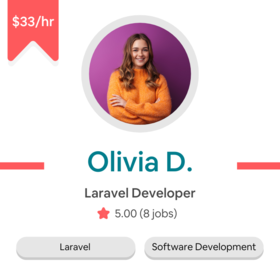













Java has always been an exceedingly popular and versatile software development technology. It’s a widely used software platform and programming language that runs on millions of devices, including computers, game consoles, medical devices, cell phones, and more. Cad Crowd has what it takes to deliver only the most talented Java developer candidates.
More than just a programming language for software/app server-side development, Java is also a software platform in which the syntax and rules are based on C and C++ languages. In 1991, when James Gosling of Sun Microsystems (later acquired by the Oracle Corporation) invented Java, the main purpose was to create a programming language compatible with every device or system in existence. Based on that idea, Sun Microsystem created the slogan "write once, run everywhere" in 1995 to illustrate Java's cross-platform capabilities.
The only catch was that all those devices must be equipped with Java Virtual Machine (JVM), part of the Java Runtime Environment (JVE). However, since there were multiple JVM implementations across a variety of operating systems, there could be unpredictable subtle differences when a Java program was executed on any given JVM/OS combination. As a result, the cross-platform compatibility never really freed the developers from conducting various tests and tweaking the program on the target OS/platform. All this gave rise to the “write once, debug everywhere” mock slogan.
But that was in the bygone years. Thanks to countless updates and efforts at standardization, Java and JVM have moved a long way from being a hassle into real power in the web/app development ecosystem. New programming languages and software tools come to the market at a blisteringly fast pace, displacing the existing technologies and rendering the old ones obsolete. In light of this seemingly constant cycle of turnover, Java's longevity and continued relevance are particularly impressive.
And now, once again, we're at a point where "portability" is Java's biggest selling point. More than three decades after Java first came to the scene, the programming language remains important and a popular choice for software development. According to the Stack Overflow Developer Survey (2023), Java was the 7th most popular web technology of the year; it was behind JavaScript, Python, HTML/CSS, and SQL, but still preferable to C, C++, C#, and PHP.
Developers need the Java Development Kit (JDK) to create software or applications written in Java programming language. JDK is available for Windows, Linux, and macOS. The compiler then transforms the application into Java bytecode, which essentially is a set of instructions for the JVM. Java bytecode can run on any system that supports JVM with little to no modification.
As mentioned earlier, there are two types of Java: the programming language and the software platform. JVM and Java API, along with a complete development environment, are available in the software platform. The Java API itself is composed of tools and libraries, including but not limited to security functions, networking tools, web services, and Extensible Markup Language (XML) features. All are working together with JVM, which parses and interprets the bytecode. In the hands of competent developers, the Java software platform and programming language are capable of creating robust enterprise-level software and applications.
Interoperability across disparate operating systems and devices has always been the core philosophy of Java. If your next project involves creating enterprise-level software and applications, interoperability alone is more than enough reason to choose Java over any other alternative. The object-oriented architecture allows developers to write reusable codes and modular programs, which effectively shorten the development cycle and ease the maintenance task. Modularity ensures that developers can add new features as soon as they become available and remove the old ones without affecting the rest of the application.
Scalability is another major strength of the Java platform. An application that's originally built for a desktop environment might be adapted to work on smaller devices with limited hardware resources. The opposite is also true: developers can transform a mobile app into a desktop program, with some tweaking, of course. Java even has the functionality to facilitate practical integration (instead of transformation) between mobile apps and desktop software, bypassing the potentially expensive and lengthy development.
In case you're in the business of using or selling IoT devices, Java is regarded as an ideal platform and programming language for the purpose. A typical IoT application connects multiple different devices within the same network, so they may interact with each other to automate various functions for users. Java can simplify the connections because billions of modern Internet-enabled devices already support JVM. It also helps that OpenJDK is an open-source implementation of Java SE (Standard Edition), which means developers focusing on the IoT applications (or any other program developed with OpenJDK, for that matter) have easy access to new third-party tools and libraries free of charge.
Interoperability, scalability, and IoT readiness are all compelling technical arguments, but Java's business advantages are equally convincing.
More companies are implementing machine-learning devices in conjunction with cloud solutions and IoT tools to assist with their day-to-day business operations. As such, the demand for talented developers continues to grow. The problem is that, at some point in the near future, the demand for senior-level programmers might actually exceed the available supply.
Java isn’t likely to have the same issue, both as a programming language and as a software platform. Java’s large talent pool is in itself a pretty strong argument for businesses to launch a software initiative built on OpenJDK. It has been around for more than three decades with barely any sign of a declining user base, especially in the enterprise environment. If your company opens a position for a senior Java developer, you can expect to receive a good number of resumes. Many of them might be independent developers (as opposed to the sought-after experienced passive candidates), but it doesn’t always mean they’re less qualified in any way.
Java also doesn't likely suffer from the lack of junior developers because the programming language is relatively easy to learn. It remains a popular choice as an introductory programming language in computer science study. Most junior developers with a bachelor's degree (although they may specialize in other technologies later on) at least have a basic understanding of Java. The shorter learning curve and an active online community of developers create a beginner-friendly environment to help ramp up productivity. Junior developers can quickly catch up with their more experienced peers, whereas seasoned professionals can always rely on the community at large for problem-solving tools and solutions.
And when it comes to problem-solving tools, Java comes with a wide range of Integrated Development Environments (IDEs). In most cases, having an experienced Java developer on your team means you don’t have to spend many work hours and days figuring out which IDE is best for your current project, programmers’ skill levels, development method, and budget. A seasoned developer can pinpoint the most efficient IDE based on the type, size, and complexity of the application. Eclipse, NetBeans, and IntelliJ IDEA are best for business applications, whereas Eclipse Che, BlueJ, DrJava, and JCreator are ideal for lightweight programs.
If your company has been using enterprise applications or programs built on Java, whether for production lines or administrative work, chances are the system already has millions of codes that basically govern how every machine in the building functions. It also means you need someone with expertise in Java to help you maintain, upgrade, and troubleshoot the codebase.
But Java is not just for legacy applications; its cross-platform compatibility, ease of use, security, and robustness make Java an excellent programming language of choice for online enterprise shops. Java has always been part of the technology stack used by such large corporations as Microsoft, Google, Zillow, Instagram, Uber, Netflix, and Amazon, to name a few. While most typical users will never see Java in action on their screen, the application servers form the foundation of stable deployment with time-tested functions for connectivity, transaction management, performance optimization, clustering, and security. With experienced Java developers on your team, there’s no reason you can’t build equally robust applications and web services as those run and maintained by big companies.
Cad Crowd has been connecting developers and employers long enough to know how to pick the most qualified candidates for specific job requirements and projects. As a professional staffing agency, we understand that each company has its own preferences, existing team, workplace culture, and, of course, budget limitations in every hiring process. This is why we won’t just pick the priciest candidate with the longest portfolio and consider it a job done.
We take pride in our work as an "employment matchmaker" in that we ensure that the selected candidates are culturally fit and able to make positive contributions as soon as they join your team. Reach out to Cad Crowd for a free quote, and we can schedule a detailed discussion about your hiring requirements, including timeline, job requirements, types of projects, and basically anything related to the open position in your company.
Unlock the immense potential of Java for your business with our top-tier Java developers. Whether you're diving into the world of microservices, getting into Android app development services, or navigating the intricacies of enterprise software, we've got the expertise to guide you. Don't be left behind in the ever-evolving realm of technology. Engage with our Java professionals today and transform your vision into robust, scalable, and efficient solutions. Request a free quote now, and let the Java adventure begin!


